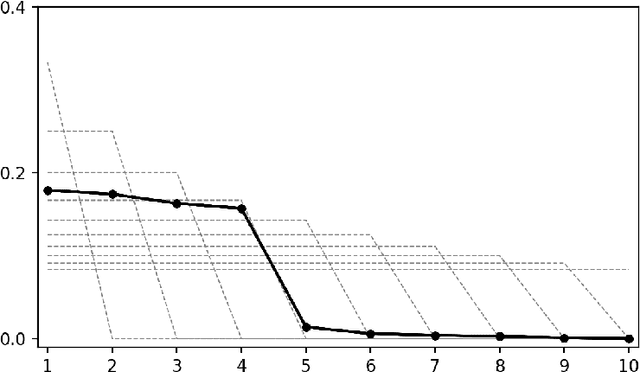Uzu Lim
Cover Learning for Large-Scale Topology Representation
Mar 12, 2025Abstract:Classical unsupervised learning methods like clustering and linear dimensionality reduction parametrize large-scale geometry when it is discrete or linear, while more modern methods from manifold learning find low dimensional representation or infer local geometry by constructing a graph on the input data. More recently, topological data analysis popularized the use of simplicial complexes to represent data topology with two main methodologies: topological inference with geometric complexes and large-scale topology visualization with Mapper graphs -- central to these is the nerve construction from topology, which builds a simplicial complex given a cover of a space by subsets. While successful, these have limitations: geometric complexes scale poorly with data size, and Mapper graphs can be hard to tune and only contain low dimensional information. In this paper, we propose to study the problem of learning covers in its own right, and from the perspective of optimization. We describe a method for learning topologically-faithful covers of geometric datasets, and show that the simplicial complexes thus obtained can outperform standard topological inference approaches in terms of size, and Mapper-type algorithms in terms of representation of large-scale topology.
HADES: Fast Singularity Detection with Local Measure Comparison
Nov 07, 2023



Abstract:We introduce Hades, an unsupervised algorithm to detect singularities in data. This algorithm employs a kernel goodness-of-fit test, and as a consequence it is much faster and far more scaleable than the existing topology-based alternatives. Using tools from differential geometry and optimal transport theory, we prove that Hades correctly detects singularities with high probability when the data sample lives on a transverse intersection of equidimensional manifolds. In computational experiments, Hades recovers singularities in synthetically generated data, branching points in road network data, intersection rings in molecular conformation space, and anomalies in image data.
Tangent Space and Dimension Estimation with the Wasserstein Distance
Oct 12, 2021



Abstract:We provide explicit bounds on the number of sample points required to estimate tangent spaces and intrinsic dimensions of (smooth, compact) Euclidean submanifolds via local principal component analysis. Our approach directly estimates covariance matrices locally, which simultaneously allows estimating both the tangent spaces and the intrinsic dimension of a manifold. The key arguments involve a matrix concentration inequality, a Wasserstein bound for flattening a manifold, and a Lipschitz relation for the covariance matrix with respect to the Wasserstein distance.
 Add to Chrome
Add to Chrome Add to Firefox
Add to Firefox Add to Edge
Add to Edge